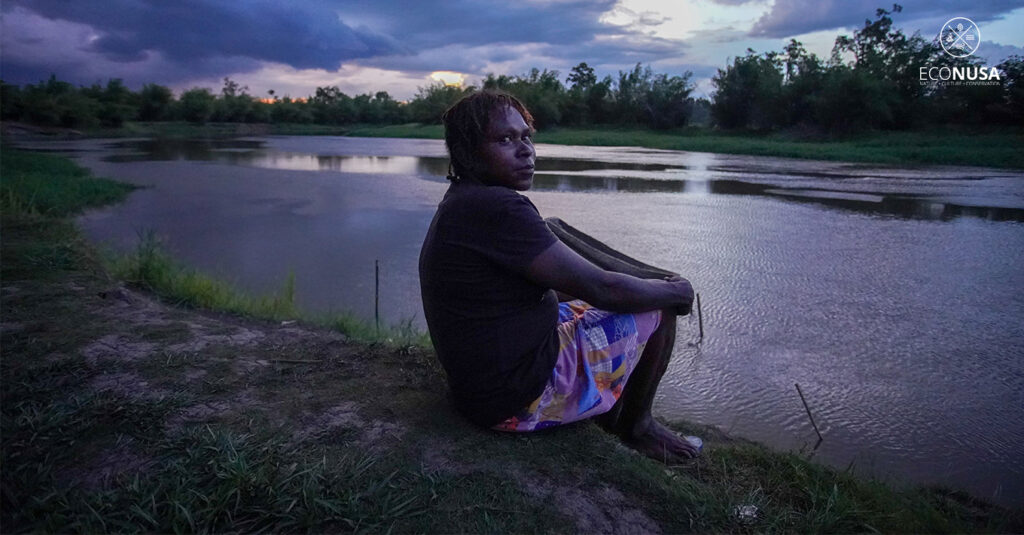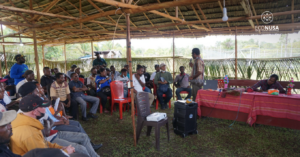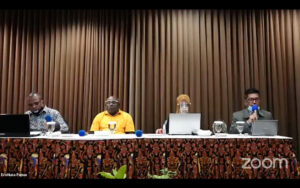
Sote District, Merauke Regency in Papua. (EcoNusa/Moch. Fikri)
Cristofora Kwerkujai cleaned up her garden nearby Maro River in Erambu Village, Sote District, Merauke Regency, early November 2021. On that afternoon, she did not do many activities at her garden. She had just harvested some vegetables such as long bean, mustard, spinach, and water spinach. “The crop is for my own consumption and for sale. One bunch costs Rp5.000. I can save up to Rp500,000 from each crop,” said Cristofora to EcoNusa.
Cristofora’s garden yielded good crops after applying knowledged from organic farming class in Samb Kai Village School in Waninggap Nanggo Village last year. She was selected by the village head to represent Erambu for farming class. The 15-day school here was held by EcoNusa Foundation in collaboration with INSIST and Caritas Merauke.
In organic farming class, village school participants studied soil nutrient elements, soil acidity, plant rotation, and how to create organic fertilizer and pesticide. All organic farming materials can be easily found surrounding the village. To create liquid fertilizer, for instance, the materials are from banana stem, leaf, bamboo root, bean sprouts, chilly, and ginger. After blending those materials, they are mixed with rice water, coconut sugar liquid, and coconut water. Then, keep the mix for a week before use.
Village School
Before moving into the planting plot, the seeds were sown by using different containers for 14 days. Besides, the distance among plants should also be taken into consideration for giving space to grow. Chilly, for instance, should be planted within 30×50 centimeters space among each other. Before getting such knowledge from village school, Cristofora did not apply this technique.
“I just scattered all seeds in the garden. The crop is less in quantity that it could only suffice for 2-3 days. We had no idea of how to plant. We just tried out. But on the village school I studied it seriously. We do not put seeds carelessly now,” she said.
Cristofora has no longer planted any vegetable now. Since December to mid of 2022, Maro River will be in high tide in such a way that it inundates Cristofora’s garden. She should have strategy to get new land for garden, or it could be replanted when Maro River dries during dry season.
Customary ownership system in Tanah Papua will not enable Cristofora to cultivate her land at Erambu Village, her current resident. Cristofora’s fam is Kwerkujai, a clan of villagers in Poo Village, Jagebob District. Her husband, Benediktus Kosnan, had the same fate despite the fact that he grew up in Bupul village. “I live together with my mother-in-law. My husband is from Erambu, but his land is located outside the border because he belongs to Kosnan clan. The native Erambu peoples are of the Awaniter clan,” she said.
Despite the fact that she does not belong to the native of Erambu, Cristofora has been trusted to represent Erambu Village. The representation is the commitment arising after ten village heads in Merauke took parts in village head workshop. In addition to Cristofora, Mikela Kosnan has become other representative for data center class.
As to her, she was the shortlisted participant because she committed to follow the series of Samb Kai Village School of Samb Kai. “Based on the village head consideration, male villagers would not be willing to participate in the activity. So, it was me who was appointed. In every activity from Caritas or others, I or my husband is usually appointed,” said Cristofora.
After taking part in village school, Cristofora was eager to share her new knowledge. Unfortunately, it was not that easy to gather the community. She got adverse response. “They said ‘what do you want to gather people?’ and “You go first and then come to us together’. That was all they said,” she said repeating what she heard.
Call for gardening
People in Tanah Papua has traumatic experience in development including empowerment program. Their attitude is the side effect of some activities carried out by the government, private, or non-governmental organization in the past. Though not all was applicable, but some empowerment programs were not comprehensively arranged. For example, economic development program for coastal community which promotes seagrass production. However, this good will stopped without touching the marketing aspect.
Cristofora lured her family to involve in organic farming. On harvest time, she shared the yields to the community for free. “I said the vegetables are free. Everyone may take them for consumption. When they asked where I could get the vegetables, I said I planted them. That’s all. They eventually concluded if she could make it, then we could do it also,” she said. She is not alone anymore. Elisabeth, Persissia, Bonefasya, and Moses also planted vegetables in their domestic yards.
EcoNusa’s Coordinator for School of Eco Involvement Carmelita Mamonto said that the Samb Kai Village School encouraged the community to become producers so that they will not be dependent in sufficing their basic needs. As to her, that was needed by the locals who particularly reside surrounding the concession of oil palm estate.
“Community life surrounding the concession is vulnerable because they have lost their forests. The community should be independent by not just being a consumer, but a producer. Planting and selling vegetables are significant changes to the locals,” said Carmelita.
Editor: Leo Wahyudi




